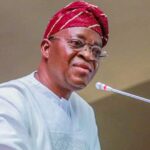Stakeholders in the electricity sector have called for the urgent need of the federal government to end subsidies to attract investments in the sector.
The stakeholders who spoke at the just concluded Nigerian Electricity Supply Industry (NESI) conference in Abuja, stated that the lack of cost-reflective tariff in the market is one of the contributory factors aiding liquidity issue that has characterized the sector since privatization in 2013.
Daily Trust reports that the federal government in the first half of 2023 paid N171bn to subsidise electricity consumed.
With the government failing to adjust electricity tariffs after the unification of the foreign exchange, and inflation, among other woes the economy faced in the second part of the year, subsidy payment would rise above what was paid in the first half of the year.
- Tobacco: Experts task media on global treaty implementation, health risks
- Emir of Kano visits Kogi, condoles family of late Ohinoyi of Ebiraland
Already, the country’s power generation has stagnated at 4,500 megawatts despite having a generation capacity of 13,000MW.
Experts have blamed the lack of investment in infrastructure which has seen the country stuck with the use of obsolete infrastructure to wheel power and maintain equipment.
Speaking at the event, the Chairman, Board of Directors of Mainstream Energy Solutions Limited, Sani Bello, said the entire value chain in the sector has suffered due to the absence of cost reflective tariff.
“What we continue to tackle today is the lack of cost-reflective tariff that will provide sustainable liquidity for the entire value chain, strengthened laws and enforcement of these laws that will criminalize and deter energy theft as well as non-payment of electricity bills,” Bello said.
He however said that 10 years after privatization, the sector has seen some growth with companies like Egbin, Mainstream, Geregu and Ughelli making strides in the generation sub-sector while Eko and Ikeja Electric have also distinguished themselves as major players in the part of distribution.
He noted that despite the achievements in the sector, energy transmission and distribution still pose a severe challenge to a functional NESI due to the state of the infrastructure and “require significant capital to finance its rehabilitation and expansion.”
In his remark, President Bola Tinubu also emphasised the need for a cost-reflective tariff in the sector, stating that the DisCos are under-capitalized to the tune of close to N2 trillion.
The Country Director, Energy Market and Rates Consultant Limited (EMRC), Rahila Thomas, stated that rising inflation, forex and other critical variables like generation capacity, and regular review of the tariff should be sacrosanct in the sector.
“A review ought to have happened in July and the realities in inflation and forex mean tariff ought to have gone up but for political reasons, this hasn’t been done.
“Government is now paying subsidies that have amounted to N3.34 trillion. Out of that, the government has paid N2.8 trillion to support the tariff,” she stated.

 Join Daily Trust WhatsApp Community For Quick Access To News and Happenings Around You.
Join Daily Trust WhatsApp Community For Quick Access To News and Happenings Around You.


